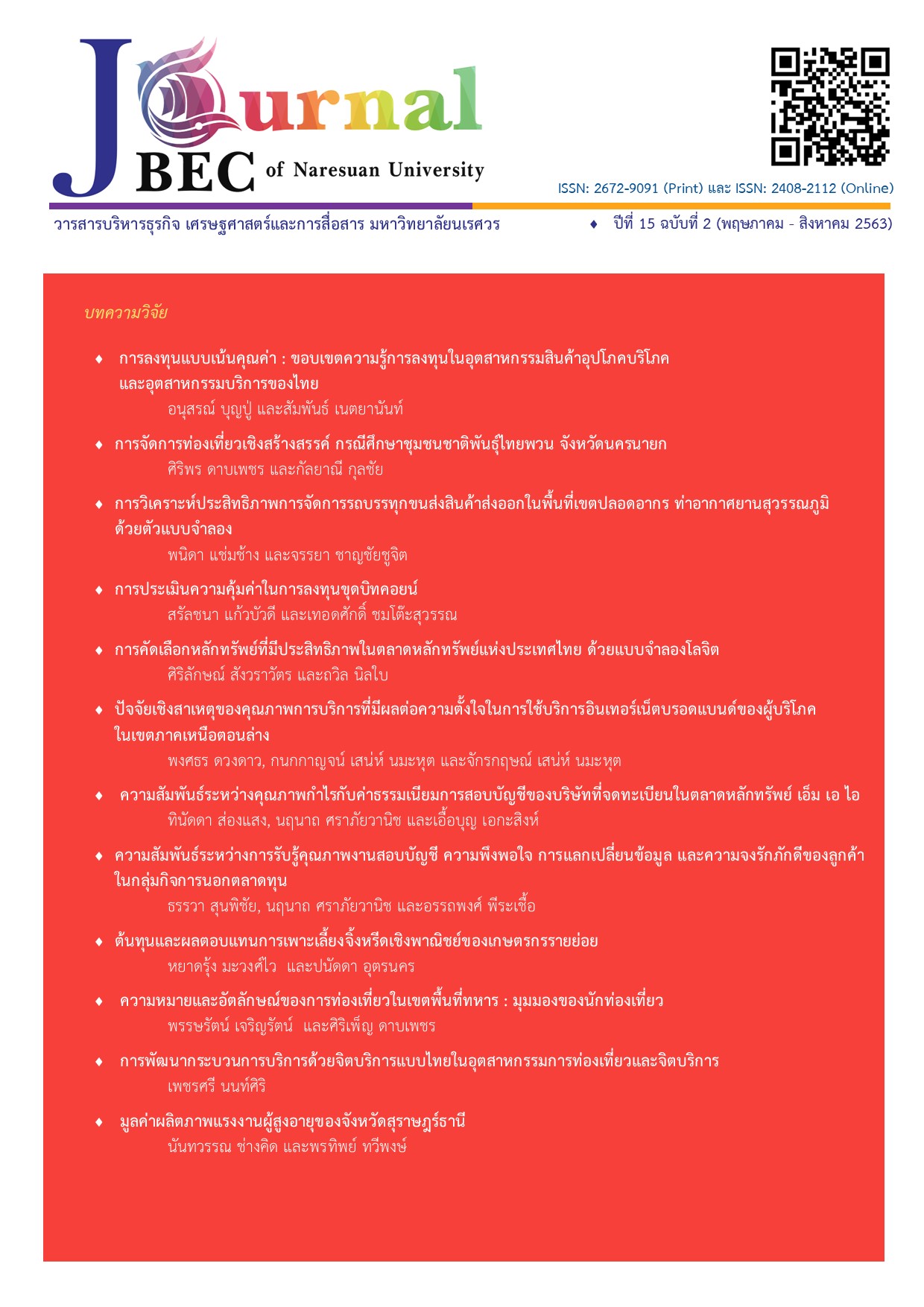Relationship Between Earnings Quality and Audit Fees of Companies Listed on the Market for Alternative Investment
Main Article Content
Abstract
This study aimed to investigate the relationship between earnings quality and audit fees of companies listed on the Market for Alternative Investment (MAI). Data were gathered from the financial statement of the companies listed on the MAI in 2015. In this study, accrual quality was used, according to the Francis, et al. (2005)’s model, to evaluate the earnings quality. Then, the multiple regression analysis was applied to analyze the obtained data. The findings revealed that there is no relationship between earnings quality and audit fees. However, the controlling variables, i.e. size, type of audit firm, and number of subsidiary company, are found to have impacts on audit fees. According to these findings, large business and business requiring services from the BIG4 audit firms have higher audit fees than small business and business requiring services from non-BIG4 audit firms.
Keywords: 1) Earnings Quality 2) Audit Fees 3) Market for Alternative Investment (MAI)
Article Details
References
Chansarn, T. (2015). The relationship between debt and earnings quality of listed companies in Market for Alternative Investment (MAI). BU Academic Review, 14(1), 71-87.
Federation of Accounting Professions. (2019). Audit Fees. Retrieved October 1, 2019 from http://www.tfac.or.th/upload/9414/IVYVS8rxRb.pdf
Francis. J., LaFond. R., Olsson. P. and Schipper K. (2005). The market pricing of accruals quality. Journal of Accounting and Economics, 39(2), 295-327.
Henchokchaichana, N. and Srijunpetch, S. (2016). Auditing. Bangkok: TPN Press.
Jensen, M. C and Meckling, W. H. (1976). Theory of the firm: Managerial behavior, agency costs and ownership structure. Journal of Financial Economics, 3(4), 305-360.
Julavittayanukool, J. (2007). The association between earnings management and audit fees of listed companies in the Stock Exchange of Thailand. Master Thesis, M.Acc., Chulalongkorn University, Bangkok.
Larcker. D. F. and Richardson, S. A. (2004). Fees paid to firm, accrual choices, and corporate governance. Journal of Accounting Research, 42(3), 625–658.
Moonsom, S. (2012). Relationship between quality of earnings and dividend changes of agriculture and food industry companies listed on The Stock Exchange of Thailand. Independent Study, M.Acc., Chiang Mai University, Chiang Mai.
Netrakat, S. (2011). The relationship between earnings management and growth opportunity of listed companies in Market for Alternative Investment (MAI). Independent Study, M.Acc., Thammasat University, Bangkok.
Pasunnajit, P. (2015). The relationship between audit quality and audit fees of companies listed in the stock exchange of Thailand in SET 100 index. Independent Study, M.B.A., Kasetsart University, Bangkok.
Reid, L. C., Carcello, J. V., Li, C., Neal, T. L., and Francis, J. R. (2019). Impact of Auditor Report Changes on Financial Reporting Quality and Audit Costs: Evidence from the United Kingdom. Contemporary Accounting Research, 36(3), 1501-1539.
Schipper, K. and Vincent, L. (2003). Earnings Quality. Accounting Horizons, 17(1), 97-100.
Sodamark, K. (2011). Relationship between discretionary accruals and audit fees of listed companies in The Stock Exchange of Thailand, group of SET 100 index in 2010. Independent Study, M.Acc., Thammasat University, Bangkok.
Tummanon, V. (2000). Have you known creative accounting and earnings quality?. Bangkok: Ionic Intertrade Resources.
Stickney, C. P. (1996). Financial reporting and statement analysis. New York: Dryden Press.
The Stock Exchange of Thailand (SET). (2016). About mai. Retrieved February 27, 2016 from https://www.set.or.th/mai/en/about/vision.html


